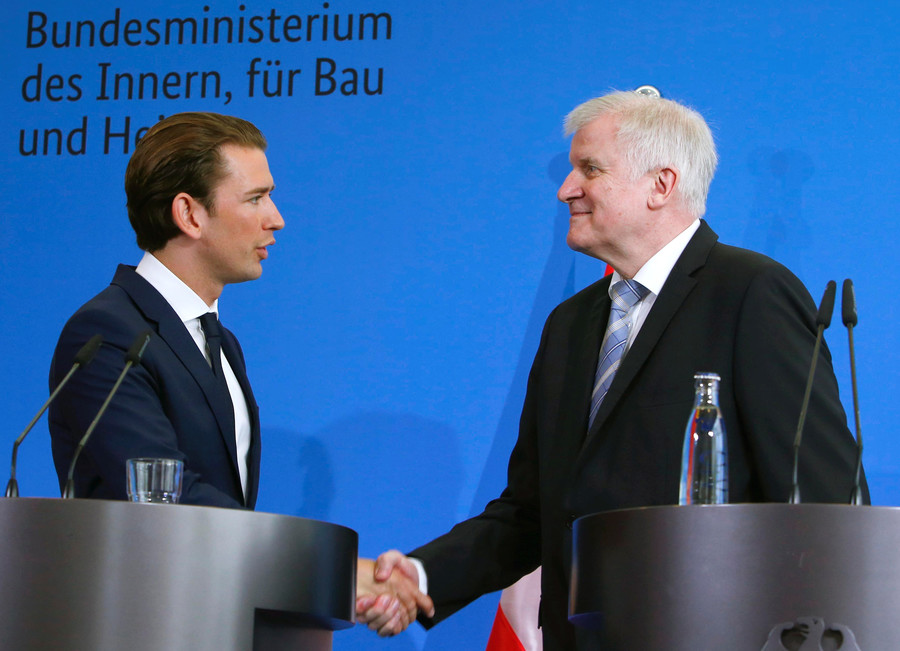
In a landmark agreement, the interior ministers of Austria, Germany and Italy have banded together against illegal migration, but the move is more likely to split the German Cabinet than it is to make the EU change its mind.
“In our view, we need an ‘axis of the willing’ in the fight against illegal migration,” Austrian chancellor Sebastian Kurz said after meeting with Horst Seehofer, Germany’s interior minister in Berlin. “I am happy about the cooperation that we want to develop between Rome, Vienna and Berlin.”
This is the first time central European powers have joined forces against illegal migrants, more than 1.8 million of whom have entered the continent in the past four years. In his statement Kurz called the peak of the influx in 2015 a “catastrophe” that “must be prevented” in the future. A previous such alliance in Eastern Europe, the Visegrád Four, led by Hungary and Poland, who erected guarded borders and refused to accept EU refugee quotas, was repeatedly censured by Brussels.
But what were dismissed as marginal or protest parties, have made a breakthrough in the past year, with the election of center-right coalition in Austria and a Euroskeptic coalition in Italian government. The centrists in Germany have also suffered historically poor results, with the right-wing Alternative for Germany (AfD) forming the biggest opposition party in parliament.
But Angela Merkel has poured cold water on the new group’s prospects, even as her own minister endorsed them.
“This is a litmus test for the future and the cohesion of Europe,” said the German chancellor after the announcement of the axis. “Europe, especially on these issues, is in a very fragile state, it is very, very important to me that Germany not act unilaterally.”
Merkel’s recalcitrance has put her on a clear collision course with Seehofer, whose CSU, theoretically a sister party of Merkel’s CDU in the large state of Bavaria, has grown increasingly rebellious.
Seehofer was due to present a 63-point “Migration Masterplan” on Tuesday, which would create an “asylum turnaround” in the country that has accepted more refugees than any other EU state. If the plan is enacted, migrants who had already registered in other EU countries would be sent away from Germany’s borders and returned to the initial country. While it fits in with the idea that asylum seekers should not “shop” for the country that gives it the best welcome and benefits, Merkel has feared that copycat laws would follow across Europe, as one country after another would close its borders to avoid becoming the receptacle for all of the continent’s undocumented migrants.
With the rift exposed, Seehofer demonstratively and symbolically pulled out of a scheduled conference on integration on Wednesday, instead choosing the counter-program to meet with Kurz. Despite the gulf between him and Merkel, Seehofer insisted Wednesday that he aimed to strike a compromise with Chancellor Merkel this week.
But whatever the final wording of the agreement adopted by Germany on migration, all laws continue to be one step behind the reality, with the furious rows over the ongoing fate of the Aquarius migrant boat vividly illustrating the deep-seated cleavages inside Europe.
Italy refused to accept the migrants in its ports, French President Emmanuel Macron called the decision “cynical and irresponsible,” Rome accused Paris of hypocrisy and offered to relocate some of its previous arrivals to France, Malta also refused entry, and Spain finally accepted the migrants.
So the exact lack of unity and political football that Merkel is wary of is already here, and has been throughout the migrant crisis. While the UN has called on the EU to reform its policy, this seems impossible, as Brussels itself and several of its key leaders in France, Germany, Spain and parts of Scandinavia broadly support continuing to accept undocumented migrants, while others would sooner leave the union than hand out residence permits to thousands of newcomers.
RELATED ARTICLES
- German School Bans Children from Drinking Water Because its Offensive
- Italy Fines TikTok with 10 million euros over Repeatedly Exposing Children to Indecent Content
- Turkish students film themselves beating and torturing 12-year-old German child
- Spanish Priest Faces Up To 3 Years In Prison For Criticizing Islamic Extremism
- EU conservative leaders Meet in Romania for Reelection and Victory lap











